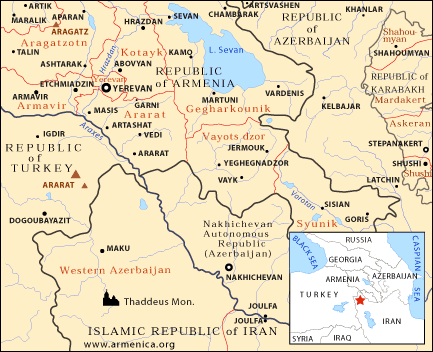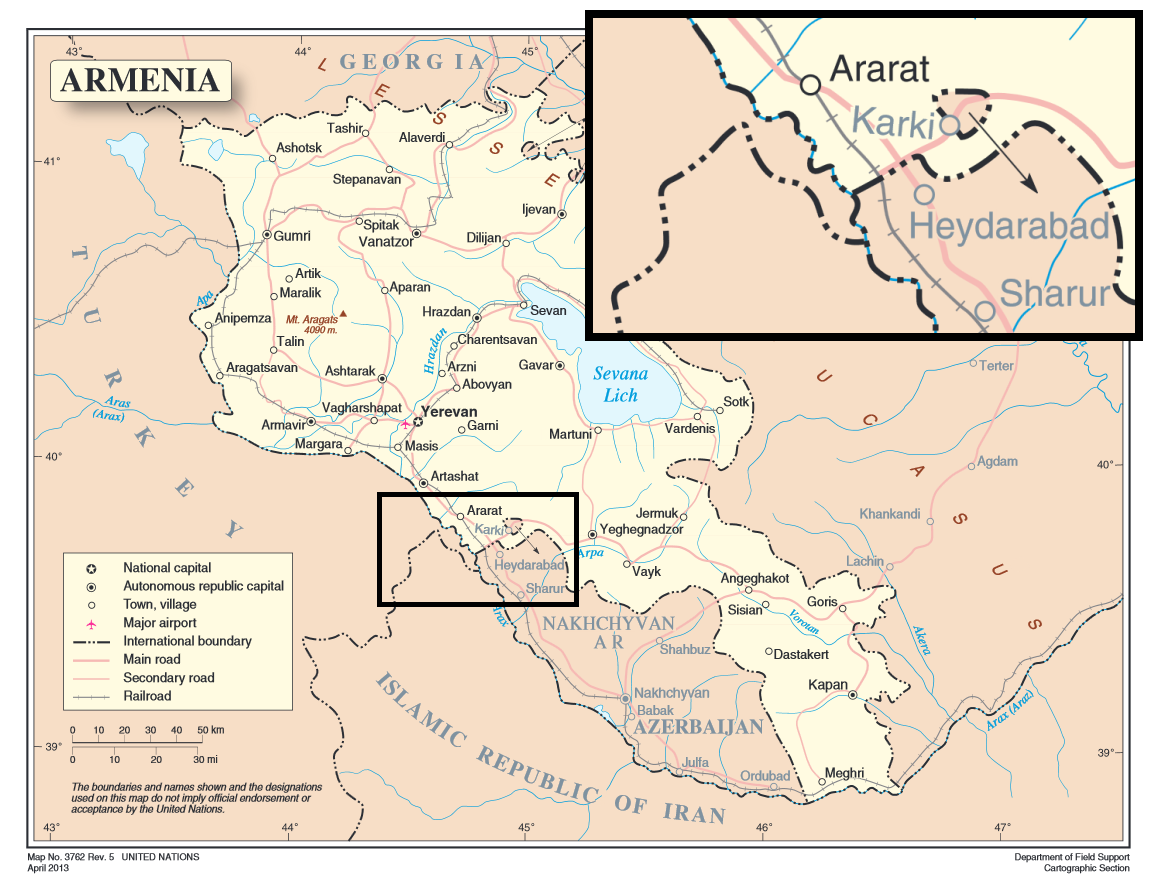Nakhchivan in the Fall of 1920 ends here.//
Turkey-Nakhchivan Border see this paper for an exhaustive
explanation of the border situation, which is a reality today
thanks in large part to the efforts of the Turkish detachment
in Nakhchivan chronicled here.

Disposition:
A – Attack the rear of the enemy’s flank with a battalion and all cavalry;
have the other battalion remain behind the flank as a reserve against
Dehne, moving it in the direction of Veli Dağı (Veli Mountain);
B – Block the enemy at the front with the militia troops that have been
engaging the enemy on two fronts;
With regard to disposition, this must also be mentioned:
The people are hungry. Their trust in the detachment is quite genuine.
So, taking advantage of this trust, the following message was sent to
the villages:
The detachment is starting the attack. The people should come to
Karabulak to get provisions from the Armenian storehouses!
The consequence of this was that the Armenian troops, seeing a great
crowd heading toward their line of retreat, panicked while the
detachment and the populace came up behind the enemy.
Implementation
Contrary to the decision, the cavalrymen fought on foot at the attacking
enemy’s front and got stuck there, so they could not come to the
location designated for the counterattack. After waiting in vain for two
hours for the cavalry, the detachment troops began the attack on their
own. Since the attack was launched from behind the enemy and, as
described above, together with a large crowd of the populace, along
with one cannon’s fire from the side, the enemy was bewildered. The
attack was successful. The enemy’s line of retreat was cut off and those
fleeing were tracked down one by one and, together with their
commanders, cornered.
The New Situation
The enemy that was headed in the direction of Karabulak was destroyed.
Those enemy elements coming from Yağcı were stopped. The enemy
at Dehne did not move. The troops fell back behind the Dehne Pass and,
taking full advantage of this, the decision was made to attack from the
rear of the Dehne Pass in order to further capitalize on our success.
Map 5 Legend:
Situation after 15 November 1920/Operation carried out by 0330 hours.
Turks
Attack directions
Armenians
Retreat directions
The large town at upper left is Sadarak. The dark lines show
the Turkish elements heading that way through Little Dehne
Pass. Dehne Pass is at left where the road and rail line are
shown.
Disposition
A- Cavalry will advance in the direction of Little Dehne.
B- The 1st Battalion will continue its march in the direction of Veli
Mountain.
C- The 2nd Battalion will follow the cavalry.
The rear side of Dehne is swamp and only the railway and the road
go through. The road should be seized as soon as possible.
Implementation
A- Cavalry went towards the north, encountered 8 enemy soldiers
and were held up dealing with them for about an hour.
B- When the 2nd Battalion reached the west opening of the Little
Dehne Pass, they saw the end of the enemy’s marching column from
2 kilometers away.
Although two heavy machine guns were fired at the enemy marching
column, there was no effect. After the enemy passed Sederek and
began to retreat with the support of cannon fire, the militia cavalry cut
off only a portion of the enemy force, even though they had seen them.
So a great opportunity was missed. But here I must say something in
the name of the heroic Turkish cavalry. There is a particular aspect to
the cavalry written about here: the militia cavalry is made up of local
people who have no training or experience. There is no doubt than if
this had been the Turkish Army cavalry this opportunity would not
have been missed. As a matter of fact, in the first phase of the battle,
without hesitation, the 10 Turkish cavalry at the detachment HQS
went to the rear of the Armenians and made an Armenian regimental
commander defend himself in a rocky place.
The enemy was pursued along the rail line and on the morning of 16
November the advance troops of the detachment reached the Ararat
station. There was no sign of the enemy. It seems that the enemy had
panicked.

The Armenian elements that were persevering against the 11th
Division on the Iğdır front had to withdraw to Yerevan in the face of
the detachment’s threat. (map 6)
In the course of the battle, two machine guns and quite a large amount
of weapons, ammunition and provisions were seized, along with 210
prisoners, 3 of them officers. On the evening of 15 November the
Armenian government requested an armistice. (agreed to on 18
November/3 December, depending on which calendar is used.)
Map 6: shows the general disposition of the Armenian Army
(compare with Map 1)
Scale: 1/1,000,000
Turks _______________
Armenians ------------------
The Turkish 15th Army Corps is shown
advancing toward Yerevan at upper left from
the northwest, while the Turkish detachment
from Nakhchivan moves up from the south.
//End of Part V/FINAL//



Hiç yorum yok:
Yorum Gönder